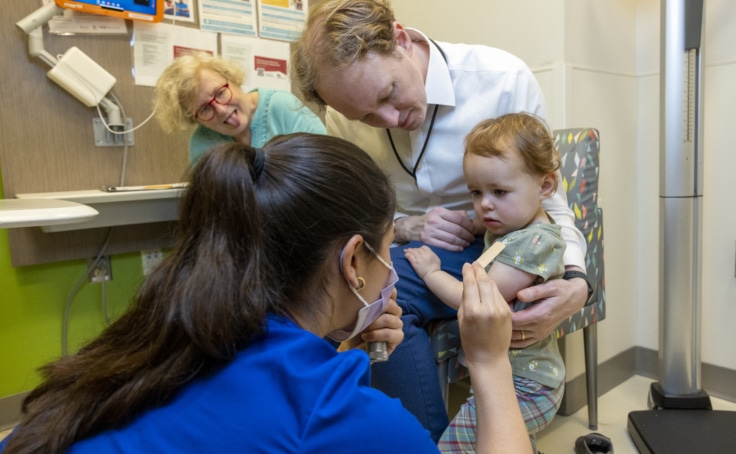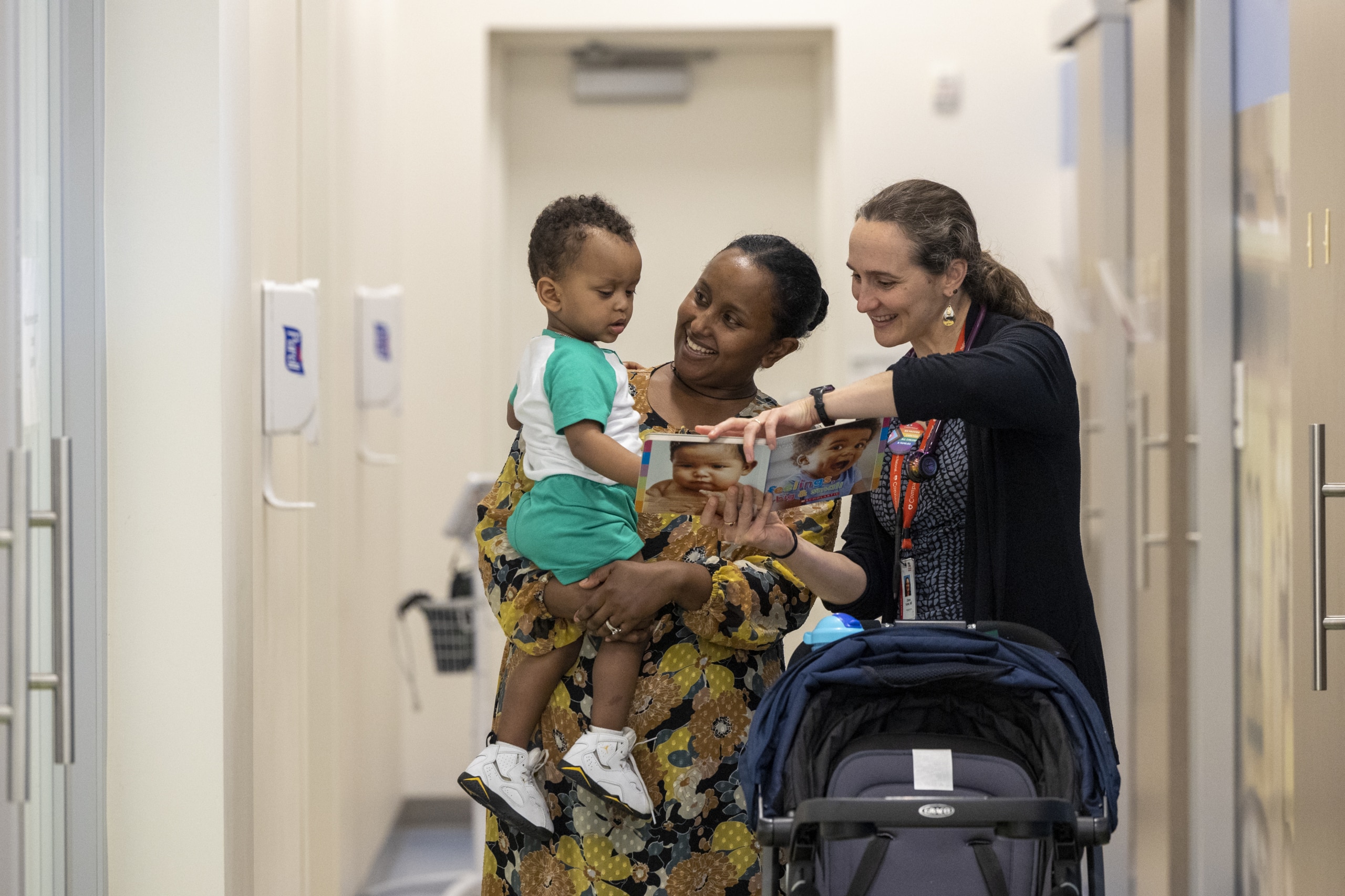Child Vaccines: Families Have Questions. We Have Answers.


By putting relationships at the heart of our work, we acknowledge the profound effect that others have on us…
Talking with Families About Vaccines
Here are some common vaccine questions families often ask, along with sample responses written in a clear, supportive tone for early childhood professionals or parents.
Families often bring questions about vaccines to their child’s doctor or another trusted professional. Here you’ll find some of the most common questions, along with sample responses that explain the basics of vaccine science and offer clear, supportive information.
It’s a good sign when families are engaged in their child’s health. Their questions show care and commitment. When early childhood professionals talk with families about vaccines, focus on two things:
Validate concerns. It’s natural for parents to ask questions about their child’s health.
Acknowledge their role. Caring parents seek information to make the best decisions for their child.
Because most states require children to be up to date on vaccines before entering child care or school, these conversations also support families in meeting enrollment requirements. Responding in a calm, fact-based, and nonjudgmental way helps answer questions while strengthening trust and relationships.
What is a vaccine?
A vaccine is a substance that, when given to a patient, triggers their body’s immune system to build protection (or an immune response) to a specific disease. Vaccines are often given through an injection (or shot), although some are given orally (by mouth) or sprayed through the nose. They can be made from a weakened or inactive form of the disease. Or vaccines may use just part of the germ (protein, sugar, etc.) to trigger an immune response.
Are vaccines safe?
The short answer is yes, and here’s why:
- Vaccine ingredients are well-researched and safe for humans.
- Vaccines go through years of research in the lab. Vaccines are then tested with thousands of volunteers. Testing determines the safety, effectiveness, and dosage of the vaccine. The data from this testing is reviewed by scientists and doctors at the US Food and Drug Administration (FDA). The FDA must approve the vaccine before it can be used in communities. It takes about 10-15 years for a vaccine to be researched, tested, and approved. The reason the COVID vaccine was released so quickly is partly because researchers have been studying its virus “family” for more than 50 years. Also, massive funding was provided to develop a COVID vaccine, which allowed the research to happen more quickly than usual.
- Even after a vaccine is approved, the US government still monitors its safety. The Vaccine Adverse Event Reporting System (VAERS) allows people to submit a report suggesting a link between vaccines and a medical condition. Scientists then do careful research to see if this link exists.
Do vaccines cause autism?
Vaccines do not cause autism. Thousands of studies have been done across the world, involving millions of children, to research this question. No reliable research-based link between vaccines and autism has ever been found.
In 1998, a doctor published a paper—with false information—making a connection between autism and the MMR (measles, mumps, rubella) vaccine. He lost his medical license for presenting dishonest science. Unfortunately, the damage was done.
For years, this misunderstanding has persisted. Why? It’s probably because children are receiving routine vaccines, including MMR, at about the same time that families begin to notice the symptoms of autism. However, these events are not related. One does not cause the other. We now know that autism is the result of changes in brain development that begin in pregnancy—long before vaccines are given to a child.
Is it more effective for children to catch the illness and develop immunity that way?
It is true that children can develop immunity by recovering from a disease. However, there are some dangers to this approach. First, children have to suffer through the disease itself. Also, we can’t always predict when a child might have a serious or life-threatening response to a disease. For example, in most people, the flu is an unpleasant but fairly mild illness. However, in some cases, the flu can result in severe illness, hospitalization, or even death.
Vaccines allow children to develop immunity without the risks of the disease itself.
Is natural immunity better for kids than vaccine immunity?
Natural immunity isn’t a better or more effective type of immunity for children. Natural immunity just means your child survived the disease. In fact, for some diseases, like HPV, vaccines offer better immunity than a natural infection.
Vaccines give children the immunity they need without the risks that come from getting the disease.
Why do people sometimes get sick from a disease, even if they have been vaccinated for it—like flu or Covid? Does my child need annual boosters for vaccines they’ve already had?
Viruses like the flu are constantly changing. Each year, researchers try to find a vaccine “recipe” that best matches up to the most common strains of the virus. Unfortunately, sometimes this match isn’t perfect. And, if you catch a strain of the disease that isn’t “matched” by your vaccine, you can still get sick. What’s the good news? Research shows that vaccination helps to make your illness less serious.
Another reason you may still get sick—even if you were vaccinated—is that immune protection from vaccines goes down, little by little, over time. This is why some diseases require boosters, or an additional vaccine to “boost” your immunity. These yearly vaccinations give you the best protection from illnesses like the flu.
I remember getting chickenpox as a kid. It wasn’t fun, but it wasn’t a big deal. Does my child really need the chickenpox vaccine?
Even diseases that seem mild, like chickenpox, are costly in terms of your child’s discomfort, missing school, and parents/caregivers missing work. And—it’s impossible to predict which children will have a serious response to chickenpox. In rare cases, chickenpox can lead to hospitalization.
Also, if there is an adult in the home who is pregnant, they should not be exposed to chickenpox. Chickenpox in pregnant people can lead to severe health problems for adults and (rarely) serious birth defects for the fetus. Pregnant adults should not care for a child with chickenpox.
Unfortunately, making it through chickenpox doesn’t guarantee your child’s immunity. Even if they get it once, they can still get it again. They can also get shingles as an adult, which is what happens when the virus that causes chickenpox reactivates in our bodies later in life.
The chickenpox vaccine—given in 2 doses in childhood—offers protection to the child for their entire life and doesn’t result in any chickenpox scars!
Aren’t babies born with natural immunity? Why do they get so many vaccines so young?
Healthy babies are born with an immune system that can fight many germs. In the womb, they also receive antibodies (proteins that help us fight off germs) from their mother to give them immunity to some diseases. This is called passive immunity. After babies are born, passive immunity doesn’t last very long, and there are some diseases that babies cannot fight.
Sticking to the vaccine schedule, starting at birth, makes sure that babies stay protected from serious diseases from day one.
Many diseases are not around anymore, but children still get vaccinated for them. Are these vaccines necessary?
Think about a brick wall. Each of the bricks helps to hold the wall up. If you start to remove bricks, eventually the wall will fall down. That’s a little bit like how immunity works. When children get vaccines, they are adding bricks to build a strong immunity “wall.” When a whole community comes together to build a strong immunity wall through vaccination, everyone is protected from disease.
But when individuals take bricks out of their wall—like saying no to the measles vaccine—communities experience a gap in immunity. Diseases will find a “hole” in the wall and work their way into a community. This gap in community immunity is why we have begun to see small, local outbreaks of diseases, like measles, that we used to think were gone.
Regular, consistent vaccines for all diseases—even if they are not in our community right now—help to keep all children safe from disease.
Are children getting too many vaccines for their immune system to handle?
The short answer is no. Most children, even young babies, can easily manage the current vaccine schedule with few, if any, side effects. Most often, side effects are a temporary low fever, fussiness, or some local tenderness near the injection (shot).
Although children get more vaccines now than they did 40 years ago, vaccine formulas have become more efficient and targeted, while providing the same benefits.
Do doctors get paid an incentive by pharmaceutical (drug) companies for delivering vaccinations?
Doctors do not get paid by drug companies for providing vaccinations. For children covered by health insurance, vaccination is billed as part of the child’s routine care. In many cases, the cost of delivering vaccines is more than the reimbursement doctors receive from insurance.
Professional advice for approaching vaccine hesitancy in parents and caregivers.


